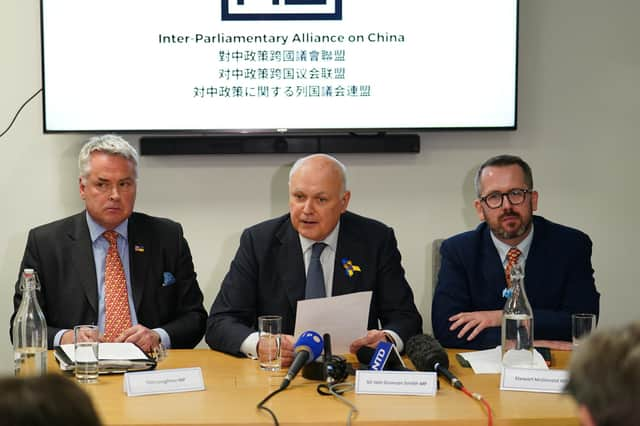UK Government China approach a 'modern form of appeasement', targeted SNP MP says


The UK Government’s approach to China is a “modern form of appeasement”, the SNP MP targeted by a Chinese cyber-attack has said.
Stewart McDonald was one of the politicians targeted, along with former Conservative leader Sir Iain Duncan Smith, ex-minister Tim Loughton and crossbench peer Lord Alton.
Advertisement
Hide AdAdvertisement
Hide AdThe Glasgow South MP ridiculed Rishi Sunak’s claim to be “robust” on China, and urged ministers to place the country in the “upper tier” of the foreign influence registration scheme.There were also harsh words for the Scottish Government, with Mr McDonald claiming the net zero targets could not be met without materials produced by Chinese slave labour.
Speaking less than a week after being named as one of 53 MPs and peers targeted by a cyber-hack, Mr McDonald claimed the idea being soft on China would encourage a better relationship was absurd.
He said: “This is the lesson from history, from the 30s, from Russia and Ukraine now, it’s the lesson we have seen from the Chinese all around the world.Gillian Keegan let the cat out the bag, saying the quiet part out loud, saying if we do too much it could cost us in trade opportunities. It’s a supine, pathetic response.
"The idea that we somehow go softly softly, China will somehow correct its behaviour and get a slap on the wrist and promise to never do it again, it’s a modern form of appeasement that just won’t work.“That’s quite a strong thing to say, but it’s absolutely where we are going. Cyber-hacks on serving parliamentarians is a deeply serious and deeply worrying thing, but it is as nothing if China is allowed to just continue down this road, upping the ratchet, and before you know it, you have some kind of war on Taiwan or an economic blockade of Taiwan that will hit the global economy far more than anything we’ve seen before”.
Mr McDonald also took issue with Mr Sunak’s claim that the UK's approach to China is "more robust" than most of its allies.
He said: “It’s just not true. There is not really a strategy. I have always said, the whole China issue isn’t some faraway foreign policy issue, it’s very much the consequence of foreign and domestic policy. That threat, that competition manifests itself is every sector of our economy and society.
“It’s a technological challenge, it’s a democratic challenge, it’s a challenge particularly for our higher education institutions. Important issues like critical national infrastructure, energy security, economic resilience.
“If the Prime Minister is telling the country he’s got the most robust strategy for meeting that challenge, then he’s done a very good job at keeping it secret from people”.
Advertisement
Hide AdAdvertisement
Hide AdMr McDonald also criticised the Scottish Government, warning both renewables and universities were too reliant on China.
He said: "Too often colleagues in Edinburgh, in all parties, but we form the Government so it matters more, see this China challenge and this China threat as a kind of far away issue.“It’s not, it’s present in Scotland, it’s in our universities, it’s in our renewable sector. We have legislated ourselves into a position where we cannot meet our net zero targets without the use of Chinese slave labour renewables material, particularly in the form of polysilicon for solar panels. Xinjiang, where it comes from, produces something like 60 per cent of the world's supply.
“To meet our targets, there is not a chance we are not importing materials that are made from slave labour”.
Asked what needs to happen, the former SNP Defence spokesperson called for UK ministers to designate China as a "threat".
He said: “The result of that would mean the activity that comes from China, particularly economic activity and investments, are subjected to far more robust oversight and screening.
“The reason it’s not there is because the Government doesn’t see it as a threat, but an economic opportunity. They want all the good bits of milking the cow, without accepting what China actually is, which is a threat to our democratic life.
“You can then start to pivot the rest of your strategy, recalibrate your institutions, your economic relationships in line with that.
“I’m not against engagement, I’m not saying there can’t be any trade, that would be unrealistic.“When you have that kind of overdependence that we have, in our universities, in our economy, in things like electrical vehicles and Chinese cellular models, there is still so much de-risking to be done.“China has not made any secret of what its ambitions are, China wants to rewrite all the rules on international cooperation, trading, war and peace, all of those things in its favour. That’s something we cannot let happen when we look at what China has been doing, both domestically and internationally, but also what its stated aims are, and the kind of threats and disruptions that would mean for us”.
Advertisement
Hide AdAdvertisement
Hide AdMr McDonald also warned failing to take strong steps now would only embolden China to make further attacks.
He said: “What if it’s the National Health Service next? Obviously they’ve done the Electoral Commission, and there’s a question over how much of the data there was of value to them, but that misses the point.
Why wouldn’t they now target the NHS? Why wouldn’t they target network rail? We’ve essentially said to them ‘come and have a go if you think you’re hard enough, we’re not going to do anything in response’”.
The UK and Scottish Governments have been approached for comment.
Comments
Want to join the conversation? Please or to comment on this article.
